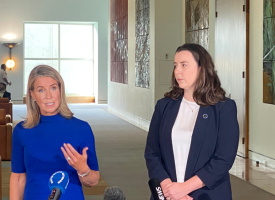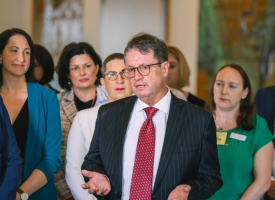Transcript - Dr Gannon - Triple J - Young people and sterilisation
Transcript: Dr Michael Gannon, Triple J Hack, Thursday 5 October 2017
Subject: Rights of young people to choose sterilisation
TOM TILLEY: Well, let's find out more about where the medical community stands on this issue. Dr Michael Gannon is the President of the Australian Medical Association. He's a gynaecologist and an obstetrician, so it means he specialises in pregnancy and childbirth. Michael, thank you so much for joining us. When a younger woman wants to get her tubes tied, does it put doctors in a pretty difficult position?
MICHAEL GANNON: It can put doctors in a difficult position, because we normally like to work in partnerships with patients, and we normally like to act in accordance with their autonomy and their wishes. Many gynaecologists work within hospitals where there are specific policies on this issue, and I can tell you from clinical experience, I have been involved with any number of women who have changed their mind very quickly after making this decision, despite having had it made very clear that it should be regarded as an irreversible procedure.
TOM TILLEY: So how does a doctor make the decision whether or not to let them go ahead with it, and is it based on their personal values, the values they might have around children and family, and how much should those personal values play a role in a professional decision?
MICHAEL GANNON: That's a good question. I think that doctors can't help but sometimes transmit the way they feel on difficult social issues, difficult ethical issues, difficult clinical decisions, but that's not the way it should be. You should be able to act openly and freely, and go with what the patient wants.
Now, having said that, the doctor also has a right to withdraw from a certain form of treatment. They are entitled to make a conscientious objection, as long as it's not an emergency situation, on any clinical matter if someone's care can be transferred to someone else in a timely fashion. So although patient autonomy is probably the overriding ethical principle at play here, there are limits to patient autonomy. The doctor also has their autonomy. A doctor or an individual hospital service has their right to decide which treatments they will and won't offer.
TOM TILLEY: And it's an issue that trickily falls in the middle of those two principles.
Kate from South Australia, you've gone to a doctor and asked for this three times. They've said no. How does that feel to you?
CALLER KATE: It's been pretty disappointing and frustrating because my decision is mine. I've made that decision for my own body and, yeah, to be told no three times already has been really frustrating.
TOM TILLEY: And how do you feel when they say you might change your mind?
CALLER KATE: I can sort of understand the position that they are looking out for maybe my future self, but I'm in a different category. I already have a child. I'm already a mum. I have a child and I'm 26, but I don't want more, so I'm unsure why that decision can't be mine now to make when I already have children.
TOM TILLEY: Yeah, a very interesting position you're in there, Kate, and I guess it's more surprising to hear that you've been knocked back given that you already have a child. We've got just 20 seconds, Michael. Is there any reason why having a child actually might make a difference in this situation?
MICHAEL GANNON: The one point I would be keen to make is that there are better methods of contraception than permanent contraception. So if you tie the tubes of a 25-year-old, the failure rate is not much less than one per cent per year. So the failure rate is there.
TOM TILLEY: [Interrupts] Yeah. We're going to hit the news, Dr Michael Gannon, so I'll leave it there. Thank you so much for joining us. Interesting to hear that perspective and that point about contraception. It probably doesn't make it any easier for someone that's been told no.
5 October 2017
CONTACT: John Flannery 02 6270 5477 / 0419 494 761
Maria Hawthorne 02 6270 5478 / 0427 209 753
Follow the AMA Media on Twitter: http://twitter.com/ama_media
Follow the AMA President on Twitter: http://twitter.com/amapresident
Follow Australian Medicine on Twitter: https://twitter.com/amaausmed
Like the AMA on Facebook https://www.facebook.com/AustralianMedicalAssociation


